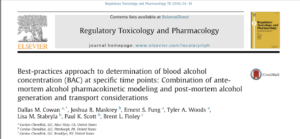The best ways to test alcohol in a DUI case
A relatively new academic and research article discusses the best ways to test alcohol in a DUI case.The article in the Regulatory Toxicology and Pharmacology journal from less than a year ago entitled “Best practices approach to determination of blood alcohol concentration (BAC) at specific time points”, discusses this in detail from a forensic toxicologist research point of view.
The study notes that alcohol testing is the number one substance that is measured in the law – far more than other substances that are illegal to drive under, including prescription drugs involved in a DUI, illegal drugs involved in a DUI, and other DUID Drug DUI scenarios. In Orange County, DUID Drugs continues to be a growing problem, but the number of alcohol cases far outweighs those of drugs.
One of the problems in measuring alcohol concentrations in living, metabolizing drivers, is that the alcohol levels are always changing. The blood or breath will have an absorption phase, where the blood alcohol increases, (leading to the rising blood alcohol defense in DUI cases), a peak at some point, and then a dissipation phase, where the blood alcohol levels decline, eventually to zero alcohol in the body.
All a breath or a blood test in a DUI can offer is information regarding an individual driver’s alcohol level at a given time. In forensic cases, the alcohol concentration in the breath (BrAC) at the time of driving is sometimes used interchangeably with the BAC (blood alcohol content) in a DUI case, without consideration for alcohol changes in the body.
The Widmark formula and model is the best method for measuring multiple alcohol (drinks) ingested at various times with alcohol elimination rate adjustments based on individual body factors. However, when it comes to the science of forensic toxicology, real world case uncertainties will always exist.
The study identifies factors that can change the accuracy of measuring alcohol in a DUI case, including the following:
Factors causing error in a DUI breath or blood test:
- Body mass index;
- Liver health;
- The state of nourishment;
- Hydration levels, or how hydrated the driver was; and
- Testing errors.
All of those, or any one of those, can be used to show reasonable doubt with the blood test or breath test in a DUI. Those same problems can be used to show reasonable doubt as to the DUI case.
(The article appears at Regul Toxicol Pharmacol. 2016 Jul;78:24-36. doi: 10.1016/j.yrtph.2016.03.020. Epub 2016 Apr 1).
Contact us.
Contact us today if you need our expertise in DUI cases, or need professional representation for your Orange County DUI case. We can help.


